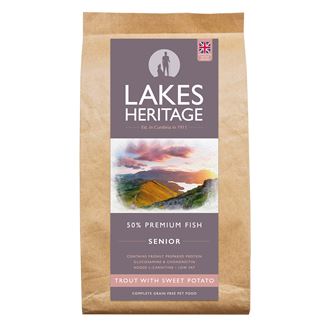Advice on a Premium Senior Dog Food Diet
Similar to humans, life expectancy for dogs has continued to increase over time, and now the average age of a dog is eleven years, with the majority being considered senior at seven or eight years. At WCF, we can offer our advice on a premium senior dog food diet so that your pet can continue to remain happy and healthy as they become older.
Why Do Older Dogs Need Senior Diet Dood?
When a dog ages it's usual for them to experience a slower pace of life. They may develop vision problems and you might see lumps or discover other skin complications. Bad breath, dental issues, and excessive drooling are other symptoms associated with ageing.
Senior Dog Obesity
Obesity is also a common problem for senior dogs and you may notice that they put on weight more easily. This will likely be due to a slower metabolism or because they have become less active or developed mobility issues. If this is the case it might be worth using senior light dog food.
However, it is possible that your older dog may lose weight as some pets, like adults, eat less and prefer smaller food portions as they get old. It’s important to take note of these changes in your dog and adjust their food accordingly. If your dog has no health issues, is not overweight, and is still active then there's a possibility that they could stay on their existing adult dog food. Different breeds of dogs will require a senior diet at different times.
Nutrients for Older Dogs
Diets for senior dogs are formulated to respond to their specific ageing nutritional requirements. Proteins, calories, vitamins, and minerals are carefully controlled to help avoid weight gain, aid the immune system, and limit pain in ageing joints.
A premium senior dog food will ensure your pet will receive all the
nutrients they need in a complete meal. They will usually be higher in fiber
which will help with constipation, a common issue for older dogs. Eating
dry food can benefit a dog’s oral health by helping to prevent a
build-up of tartar and plaque, a known cause for gum disease.
Tips on Feeding an Older Dog
When switching from adult food to a senior one it is important to change it gradually over 7 to 10 days, each day increasing the portions. A sudden food switch can cause your senior dog to have an upset stomach.
- Serve the food indoors at room temperature to bring out the smell.
- Your ageing dog will prefer peace so if you can, feed your dog in a quiet, private place away from any other dogs. An older dog will likely suffer from arthritis at some point so it is a good idea to serve the food on a raised bowl so they don’t have to bend down unnecessarily.
- Store dry, complete foods in an air tight and sealed container to retain the smell and freshness.Always ensure your dog has access to fresh, clean water in order to stay hydrated.
- Remember, always consult with a vet if you are unsure of the best way to feed your dog or concerned about any health issues associated with your ageing dog.book.
Supplements
If you are considering giving your senior dog supplements it is best to check if their food already contains them as most complete foods will fulfil an ageing dog’s dietary needs. Existing health problems usually require specially formulated veterinary food. When you take your dog for their routine check-up, a vet will be able to give the best advice for a senior dog food diet.
For more information on providing well being for a senior dog, see the RSPCA website.

